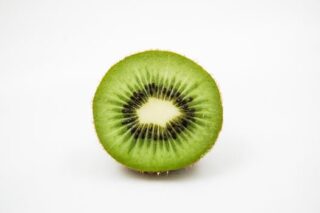
More Weight Control, Nutrition & Exercise Articles
Is Eating Kiwi Skin Healthy? Discover the Benefits and Risks

Kiwi is a delicious and nutrient-dense fruit that many people enjoy. However, a common question arises: should you eat kiwi skin? Some might be surprised to learn that the skin of a kiwi is edible and can offer various health benefits. In this article, we’ll explore the advantages and potential risks of consuming kiwi skin, helping you decide whether it should become a part of your diet.
Should You Eat Kiwi Skin?
The skin of a kiwi is not only edible but also packed with nutrients that can enhance your health. Eating the skin increases the fiber, vitamin, and antioxidant content of the fruit. However, there are considerations to bear in mind, such as texture, taste preferences, and possible pesticide residues.
Nutritional Benefits of Kiwi Skin
Eating kiwi with the skin can significantly boost your intake of dietary fiber, aiding digestion and promoting a feeling of fullness. The skin contains a higher concentration of vitamin C than the flesh, which supports immune function and skin health. Additionally, the antioxidants found in the skin may help protect against cellular damage.
Kiwi skin is also a source of vitamin E, which is vital for maintaining healthy skin and eyes. Consuming the skin can contribute to a well-rounded nutrient intake, making the most out of this small but mighty fruit.
Risks and Considerations
While there are substantial benefits, there are also risks associated with eating kiwi skin. The texture of the skin is fuzzy and can be off-putting to some. This fibrous texture might be a bit unusual but is worth trying for the nutrient boost.
Pesticide residues are another concern. Washing your kiwi thoroughly before consumption can help reduce these residues. Alternatively, choosing organic kiwis might alleviate this concern, as they tend to have lower pesticide levels. It’s also essential to be aware of food allergies; some individuals may experience oral allergy syndrome when consuming kiwi skin.
How to Eat Kiwi Skin Properly
If you decide to include kiwi skin in your diet, here are some tips to ensure you’re doing it safely and enjoyably:
- Wash thoroughly: Use water to scrub the entire kiwi gently. Organic produce is generally a better option if you’re concerned about pesticide exposure.
- Slices or whole: You can eat kiwi slices with the skin on or bite into the whole fruit like an apple, depending on your preference.
- Pair with other fruits: Mix sliced kiwi with other fruits in a salad to balance the texture and flavor.
Comparing Other Fruits with Edible Skins
Many fruits have edible skins that can enhance their health benefits, similar to kiwi. For example, apples, pears, and grapes also offer additional nutrients when consumed with their skins. Including a variety of fruits with edible skins in your diet can contribute to a diverse nutrient intake.
Keep in mind that each fruit comes with its unique benefits. For those interested in high-protein options to support weight management, consider exploring our detailed guide on the importance of a high-protein diet for weight loss.
Environmental Impact
Reducing food waste is an essential consideration in today’s world. By eating kiwi skin, you are minimizing the amount of food waste generated. This practice contributes to a more sustainable lifestyle and ensures that fewer valuable nutrients are discarded.
Final Thoughts: Should You Eat Kiwi Skin?
Ultimately, whether or not you should eat kiwi skin depends on your personal preferences and health goals. The nutritional advantages are compelling, providing an opportunity to maximize the health benefits of this vibrant fruit. If the texture or potential pesticide residues are a deterrent, ensure thorough washing or opt for organic options. Remember to consult with a healthcare professional if you have concerns about potential allergies or dietary changes.
- Kiwi skin is edible and nutrient-rich.
- Consuming the skin boosts fiber and vitamin intake.
- Thorough washing reduces pesticide concerns.
- Organic kiwi is an option for minimizing chemical exposure.
- Trying kiwi skin can contribute to a more sustainable diet.
FAQ
Is it common for people to eat kiwi skin?
While eating kiwi skin is not as common as eating the flesh, more people are adopting this practice due to its nutritional benefits.
Does washing kiwi remove all pesticides?
Washing can help reduce pesticide residues significantly, but may not remove them entirely. Opting for organic kiwis can be a safer alternative.
What are the potential allergies associated with eating kiwi skin?
Some individuals may experience oral allergy syndrome, particularly if they have allergies to other fruits such as bananas or avocados. It’s important to consult with a healthcare provider if you have these concerns.
How does the kiwi skin taste?
The kiwi skin has a slightly earthy taste and a fuzzy texture. Some people enjoy it, while others prefer to peel it off due to the texture.
Can eating kiwi skin help with weight management?
Kiwi skins are high in fiber, which may support weight management by promoting satiety. For more weight management strategies, you might find this external health resource helpful.
Other Articles You May Find of Interest...
- Does Orange Juice Go Bad? Tips for Storage and Freshness
- Power Up Your Health with These Potassium-Rich Foods
- Is Eating Kiwi Skin Healthy? Discover the Benefits and Risks
- Is Tuna a Good Source of Omega-3 Fatty Acids?
- Empowering Strength: Celebrating Women with Muscles
- Discover the Health Benefits of Black Elderberry Tea for Immune Support
- Discover the Protein Power of Shrimp and Its Health Benefits














